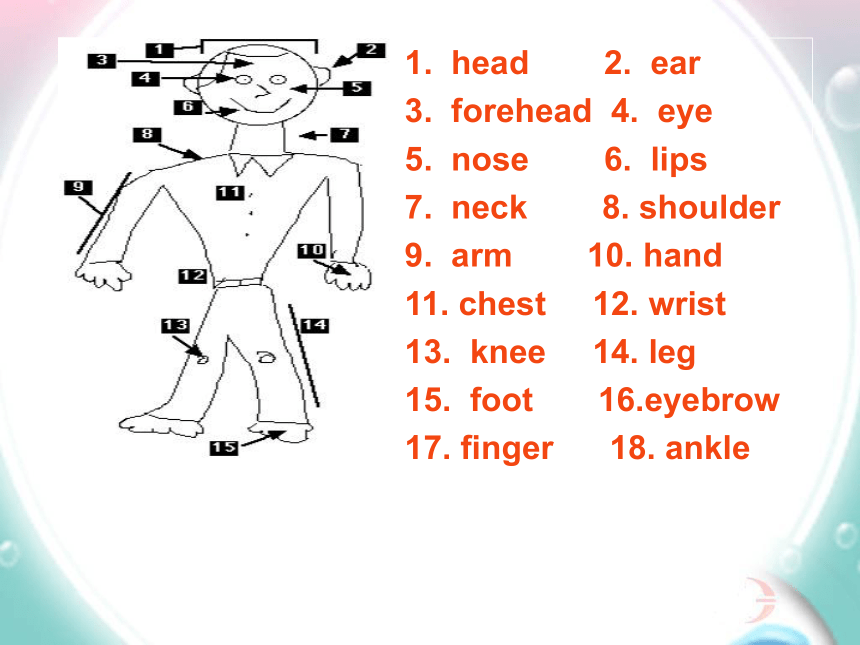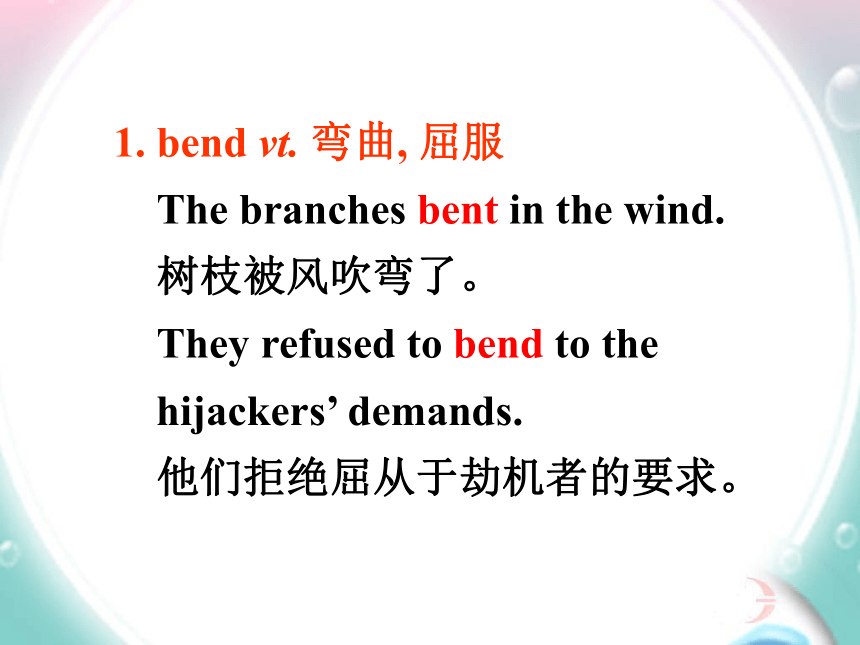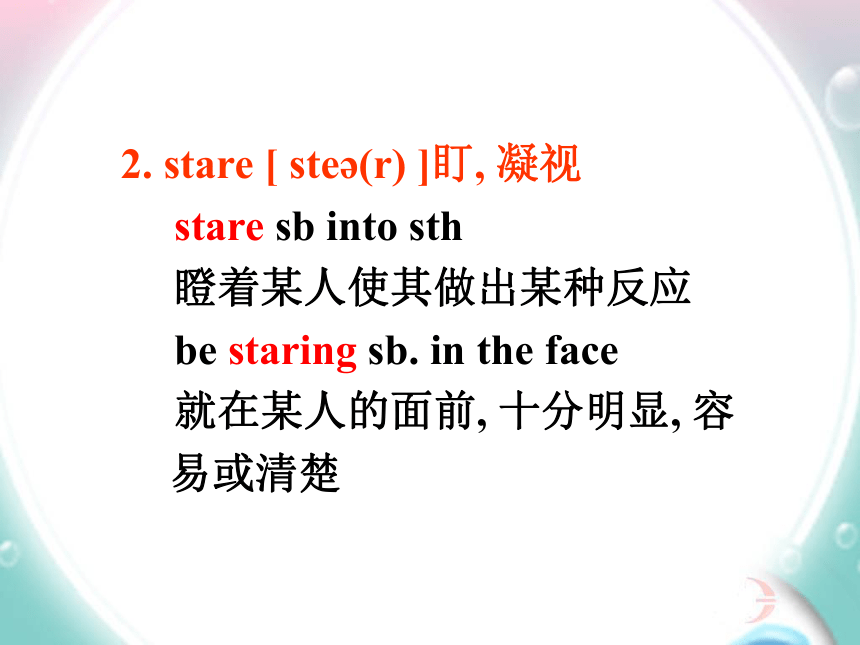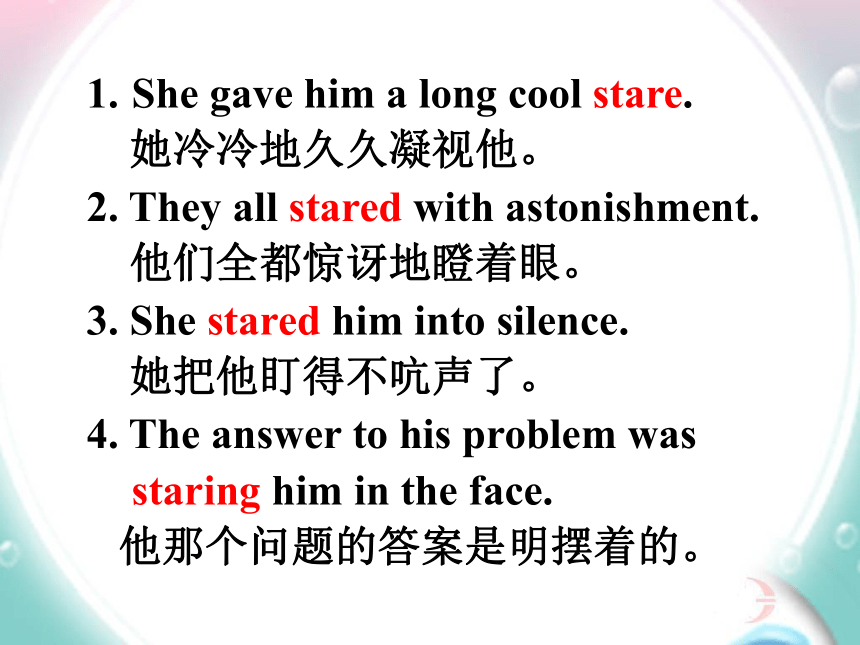Module 3 The Violence of Nature Listening and vocabulary
文档属性
| 名称 | Module 3 The Violence of Nature Listening and vocabulary |

|
|
| 格式 | rar | ||
| 文件大小 | 360.3KB | ||
| 资源类型 | 教案 | ||
| 版本资源 | 外研版 | ||
| 科目 | 英语 | ||
| 更新时间 | 2011-05-31 12:19:43 | ||
图片预览







文档简介
(共21张PPT)
Listening and vocabulary
1. head 2. ear
3. forehead 4. eye
5. nose 6. lips
7. neck 8. shoulder
9. arm 10. hand
11. chest 12. wrist
13. knee 14. leg
15. foot 16.eyebrow
17. finger 18. ankle
1. bend vt. 弯曲, 屈服
The branches bent in the wind.
树枝被风吹弯了。
They refused to bend to the hijackers’ demands.
他们拒绝屈从于劫机者的要求。
The branch bent but didn’t break when the boy climbed along it.
那男孩爬上树枝时, 树枝弯曲了, 但是没有折断。
He bent forward to listen to the child.
他弯下身来听那孩子说话。
Touch your toes without bending your knees.
用手够到你的脚趾, 膝盖别弯曲。
2. stare [ ste (r) ]盯, 凝视
stare sb into sth
瞪着某人使其做出某种反应
be staring sb. in the face
就在某人的面前, 十分明显, 容易或清楚
She gave him a long cool stare.
她冷冷地久久凝视他。
2. They all stared with astonishment.
他们全都惊讶地瞪着眼。
3. She stared him into silence.
她把他盯得不吭声了。
4. The answer to his problem was staring him in the face.
他那个问题的答案是明摆着的。
5. The book I was looking for was staring me in the face.
我找的书其实就在我面前。
6. It’s rude to stare.
盯着人看是没有礼貌的。
7. He was staring out over the fields.
他目不转睛地看外面的田野。
8. She was staring into the distance/ not space.
她凝视着远方。
3. wipe
n. 擦拭, 用力打
v. 擦, 消除, 拭去
I wiped my shoes on the mat before I came in.
我在进门前把鞋在垫子上擦了擦。
2. She wiped her tears away.
她擦掉了眼泪。
3. The entire population was wiped out by the terrible disease.
所有的居民都被可怕的疾病夺去了生命。
4. Please give the table mats a quick wipe.
请把桌上的盘碗垫擦一下。
5. This vase wasn’t wiped out properly before it was put away.
这个花瓶没擦干净就收起来了。
bend bow clap hug kiss nod raise stare wipe
Example: You use your arms to hug someone.
1. You use your lips to ___ someone.
2. If you ____ at someone you look at them for a long time.
3. If you ____ your hand you lift it up.
4. You ___ by moving your head up and down.
kiss
stare
raise
nod
5. When you bend your upper body forwards you ____.
6. You have to ____ your knees to sit down.
7. If you’re hot you can ____ the sweat from your forehead
8. At the end of a concert or a play it is usual to ____.
bow
bend
wipe
clap
lift sb/sth up 将某人/某物抬起, 举起
Listen to a conversation between an American and a Chinese student who is going to the US. Number the topics in the order they talk about them.
_____ What to talk about
_____ Gifts
_____ When to arrive for dinner
_____ What to call people
_____ How to meet new people
_____ What to say to the host when you leave
_____ When to leave the table.
1
2
3
4
5
6
7
a. You should shake hands when you meet new people. ____
b. You should bring some flowers or a bottle of wine. ______
c. You should open gifts immediately. __
d. You shouldn’t use family names. ___
e. You shouldn’t arrive too late. _______
Match the following pieces of advice with the topics in activity 3.
f. You shouldn’t talk about politics or religion. ____
g. You mustn’t leave as soon as you finish the meal. _______
h. You must thank your host for a wonderful evening. ______
i. You mustn’t arrive early. _______
What to talk about:
When to arrive for dinner:
How to meet new people:
When to leave the table:
Gifts:
What to call people:
What to say to the host when you leave:
f
e, i
a
g
b,c
d
h
课后小练
根据下列各句句意及所给单词的首字母或者汉语意思,写出该单词的正确形式。
1. She raised her finger to her l___ as a
sign of silence.
2. Janet slipped on the stairs and broke
her _______ (脚踝).
3. The police caught the thief by the
______ (手腕).
lip
ankle
wrist
用方框内所给单词的适当形式填空。
hug, wipe, stare, bend, request, toast
1. The branches were _____ with the
weight of the fruit.
2. She ________ the baby in her arms
and ran out.
3. In some countries, people think it is
not polite to ______ at a person.
4. He _____ the sweat from his forehead.
bent
hugged
stare
wiped
5. Let’s drink a ______ to our friendship.
6. Mr. Smith made a _______ that I
should help him.
toast
request
Thank you!
Listening and vocabulary
1. head 2. ear
3. forehead 4. eye
5. nose 6. lips
7. neck 8. shoulder
9. arm 10. hand
11. chest 12. wrist
13. knee 14. leg
15. foot 16.eyebrow
17. finger 18. ankle
1. bend vt. 弯曲, 屈服
The branches bent in the wind.
树枝被风吹弯了。
They refused to bend to the hijackers’ demands.
他们拒绝屈从于劫机者的要求。
The branch bent but didn’t break when the boy climbed along it.
那男孩爬上树枝时, 树枝弯曲了, 但是没有折断。
He bent forward to listen to the child.
他弯下身来听那孩子说话。
Touch your toes without bending your knees.
用手够到你的脚趾, 膝盖别弯曲。
2. stare [ ste (r) ]盯, 凝视
stare sb into sth
瞪着某人使其做出某种反应
be staring sb. in the face
就在某人的面前, 十分明显, 容易或清楚
She gave him a long cool stare.
她冷冷地久久凝视他。
2. They all stared with astonishment.
他们全都惊讶地瞪着眼。
3. She stared him into silence.
她把他盯得不吭声了。
4. The answer to his problem was staring him in the face.
他那个问题的答案是明摆着的。
5. The book I was looking for was staring me in the face.
我找的书其实就在我面前。
6. It’s rude to stare.
盯着人看是没有礼貌的。
7. He was staring out over the fields.
他目不转睛地看外面的田野。
8. She was staring into the distance/ not space.
她凝视着远方。
3. wipe
n. 擦拭, 用力打
v. 擦, 消除, 拭去
I wiped my shoes on the mat before I came in.
我在进门前把鞋在垫子上擦了擦。
2. She wiped her tears away.
她擦掉了眼泪。
3. The entire population was wiped out by the terrible disease.
所有的居民都被可怕的疾病夺去了生命。
4. Please give the table mats a quick wipe.
请把桌上的盘碗垫擦一下。
5. This vase wasn’t wiped out properly before it was put away.
这个花瓶没擦干净就收起来了。
bend bow clap hug kiss nod raise stare wipe
Example: You use your arms to hug someone.
1. You use your lips to ___ someone.
2. If you ____ at someone you look at them for a long time.
3. If you ____ your hand you lift it up.
4. You ___ by moving your head up and down.
kiss
stare
raise
nod
5. When you bend your upper body forwards you ____.
6. You have to ____ your knees to sit down.
7. If you’re hot you can ____ the sweat from your forehead
8. At the end of a concert or a play it is usual to ____.
bow
bend
wipe
clap
lift sb/sth up 将某人/某物抬起, 举起
Listen to a conversation between an American and a Chinese student who is going to the US. Number the topics in the order they talk about them.
_____ What to talk about
_____ Gifts
_____ When to arrive for dinner
_____ What to call people
_____ How to meet new people
_____ What to say to the host when you leave
_____ When to leave the table.
1
2
3
4
5
6
7
a. You should shake hands when you meet new people. ____
b. You should bring some flowers or a bottle of wine. ______
c. You should open gifts immediately. __
d. You shouldn’t use family names. ___
e. You shouldn’t arrive too late. _______
Match the following pieces of advice with the topics in activity 3.
f. You shouldn’t talk about politics or religion. ____
g. You mustn’t leave as soon as you finish the meal. _______
h. You must thank your host for a wonderful evening. ______
i. You mustn’t arrive early. _______
What to talk about:
When to arrive for dinner:
How to meet new people:
When to leave the table:
Gifts:
What to call people:
What to say to the host when you leave:
f
e, i
a
g
b,c
d
h
课后小练
根据下列各句句意及所给单词的首字母或者汉语意思,写出该单词的正确形式。
1. She raised her finger to her l___ as a
sign of silence.
2. Janet slipped on the stairs and broke
her _______ (脚踝).
3. The police caught the thief by the
______ (手腕).
lip
ankle
wrist
用方框内所给单词的适当形式填空。
hug, wipe, stare, bend, request, toast
1. The branches were _____ with the
weight of the fruit.
2. She ________ the baby in her arms
and ran out.
3. In some countries, people think it is
not polite to ______ at a person.
4. He _____ the sweat from his forehead.
bent
hugged
stare
wiped
5. Let’s drink a ______ to our friendship.
6. Mr. Smith made a _______ that I
should help him.
toast
request
Thank you!
